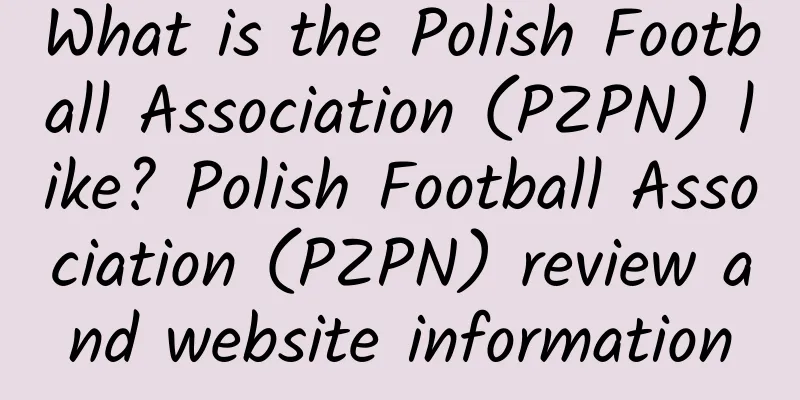What is the Polish Football Association (PZPN) like? Polish Football Association (PZPN) review and website information

|
What is the Polish Football Association (PZPN)? The Polish Football Association (Polish: Polski Związek Piłki Nożnej; PZPN for short) is the football management group organization in Poland. Its predecessor was the Polish Football Union (PFU) founded on June 25, 1911, and was affiliated with the former "Austrian Football Union". It became independent in April 1919 and established the current Polish Football Association. PZPN is mainly responsible for organizing leagues at all levels in Poland, such as the Polish Football League, etc. In addition, it also organizes the Polish Cup, Polish Super Cup, Polish League Cup and Polish national team events. Website: www.pzpn.pl Polish Football Association (PZPN): A century-old legend leading Polish footballThe Polish Football Association (Polski Związek Piłki Nożnej, PZPN for short) is the core governing body of Polish football. Since its inception, it has shouldered the important mission of promoting the development of Polish football. As the highest governing body of Polish football, PZPN is not only responsible for organizing domestic leagues, cup competitions and national team affairs at all levels, but also plays an important role in FIFA and UEFA. This article will comprehensively introduce the historical background, scope of functions and far-reaching influence of the Polish Football Association on the development of Polish football. Origin and History of PZPNThe predecessor of PZPN can be traced back to the Polish Football Union (PFU) founded on June 25, 1911. At that time, Poland had not yet achieved independence, and its territory was divided among the Russian Empire, the Austro-Hungarian Empire and the Kingdom of Prussia. In the Galicia region under the rule of the Austro-Hungarian Empire, some football-loving Poles decided to set up their own football organization to promote the development of the sport. Therefore, PFU came into being and became part of the Austrian Football League at that time. However, with the end of World War I and Poland regaining independence in 1918, the PFU also ushered in a new historical stage. In April 1919, the Polish Football Union officially became independent, breaking away from the control of the Austrian Football Union and changing its name to the Polish Football Association (PZPN). In the same year, PZPN joined FIFA, marking the official entry of Polish football into the international arena. Subsequently, in 1923, PZPN became one of the founding members of UEFA (UEFA). Since then, PZPN has gradually improved its organizational structure and laid a solid foundation for the comprehensive development of Polish football. Despite the interruption of World War II and the special environment during the Cold War, PZPN has always been committed to restoring and developing Polish football. After entering the 21st century, PZPN has continuously adjusted its strategic direction and strived to enhance the competitiveness of Polish football in the context of globalization. Main duties and functions of PZPNAs the highest governing body of Polish football, PZPN undertakes a number of important responsibilities, covering many areas including event organization, talent training, infrastructure construction and international exchanges. The following are the core functions of PZPN: 1. Organize domestic competitionsPZPN is responsible for organizing and managing all professional and amateur football competitions in Poland. The most representative competitions include the Polish Football League (Ekstraklasa), the Polish Cup (Puchar Polski), the Polish Super Cup (Superpuchar Polski) and the Polish League Cup (Puchar Ligi). These competitions form the core framework of the Polish football system, providing a platform for players to showcase their talents and attracting a large number of spectators. The Polish Football League (Ekstraklasa) is the top professional football league in Poland. It was founded in 1927. After nearly a century of development, the league has become a symbol of the level of Polish football. In recent years, with the active promotion of PZPN, Ekstraklasa has gradually emerged in Europe and attracted more international attention. 2. Manage the Polish national teamIn addition to organizing domestic competitions, PZPN is also responsible for managing the Polish national men's and women's football teams. The Polish men's football team has participated in many international competitions such as the World Cup and the European Cup and achieved impressive results. For example, in the 1974 and 1982 World Cups, the Polish team won the third place, becoming one of the most glorious chapters in the history of Polish football. At the same time, PZPN also attaches great importance to the development of youth football, and through the establishment of a complete youth training system, it provides a steady stream of outstanding talents for the national team. In addition, PZPN also actively supports the promotion and development of women's football, and strives to narrow the gap between men's and women's football. 3. Promote football popularization and educationPZPN is well aware that football is not only a competitive sport, but also a cultural and social phenomenon. Therefore, the association actively promotes football and encourages more people to participate in this sport. To this end, PZPN has established a number of special funds to subsidize grassroots football clubs, school football projects and community activities. In addition, PZPN has also cooperated with the Polish Ministry of Education to include football in the school physical education curriculum system to cultivate students' team spirit and health awareness. At the same time, the association regularly holds coach training courses and technical seminars to continuously improve the professional level of football practitioners. 4. Strengthen international cooperation and exchangesIn today's globalized world, football is no longer limited to a single country or region. In order to improve the overall level of Polish football, PZPN actively participates in various activities of FIFA and UEFA, and maintains close contact with football associations in other countries. By introducing advanced training methods, competition experience and management concepts, PZPN continues to push Polish football to a higher level. It is worth mentioning that PZPN also successfully hosted the 2012 European Cup (co-hosted with Ukraine). This event not only demonstrated Poland's ability to host competitions, but also injected new vitality into Polish football. Official website of PZPN: www.pzpn.plAs the official portal of the Polish Football Association, www.pzpn.pl is an important channel for fans to learn about PZPN dynamics and Polish football information. The website has a simple and clear design and rich and diverse content, covering event schedules, match results, player information, news reports and many other aspects. After logging in to the website, users can quickly get the latest game previews and score updates. For fans who follow the Polish national team, the website also provides a detailed list of players, introductions to the coaching team, and a review of past performances. In addition, the website also has a dedicated media center that includes various announcements, statements, and interview videos released by PZPN. It is worth mentioning that www.pzpn.pl is not only for Polish local users, but also has multilingual versions to facilitate international fans to learn about the latest developments in Polish football. This open attitude fully reflects PZPN's determination to promote Polish football to the world. PZPN's influence on Polish footballThe existence of PZPN has had a profound impact on Polish football. First, it has established a complete management system for Polish football to ensure that various competitions can be carried out in an orderly manner. Secondly, through scientific and reasonable planning and investment, PZPN has helped Polish football achieve all-round development from grassroots to elite. Finally, the successful operation of PZPN has also provided valuable experience for football management agencies in other Eastern European countries. In the past few decades, Polish football has experienced many ups and downs, but PZPN has always stood firmly at the forefront of development and constantly explored a football development model that suits the country's national conditions. It is precisely with this unremitting effort that Polish football can occupy a place in today's fierce international competition. Looking to the future: PZPN's vision and challengesIn the face of an increasingly complex global football environment, PZPN has set clear strategic goals. On the one hand, the association will continue to increase investment, further improve the youth training system and infrastructure construction, and cultivate more world-class stars for Polish football. On the other hand, PZPN will also strengthen cooperation with FIFA and UEFA, strive for more resources and support, and help Polish football move to a higher level. Of course, PZPN will also face many challenges in its future development. For example, how to balance the relationship between professional leagues and amateur football, how to attract more young people to join the football career, and how to deal with the impact of economic globalization. In this regard, PZPN needs to maintain keen insight and flexible response strategies to ensure the sustainable and healthy development of Polish football. ConclusionAs the helmsman of Polish football, the Polish Football Association (PZPN) has gone through a century of ups and downs and has always adhered to its original aspirations and is committed to promoting the progress and development of Polish football. From the initial "Polish Football Union" to today's modern management organization, PZPN has witnessed and participated in every important turning point in Polish football. I believe that in the days to come, PZPN will continue to lead Polish football to write a more glorious chapter. |
<<: How is Jamaican music? Jamaican music reviews and website information
>>: How is Kaiserslautern? Kaiserslautern reviews and website information
Recommend
Common methods to prevent food spoilage
Food often goes bad in our daily life, which make...
How to manage outdoor flowers
Growing flowers is a favorite thing for many peop...
How to make chili oil for cold noodles
Chili oil can be used with ingredients to make ma...
How to drink Noni juice and the benefits of drinking Noni juice
Noni juice is a new type of drink. It tastes swee...
How is Tyrolean Airlines? Tyrolean Airlines reviews and website information
What is the website of Tyrolean Airways? Tyrolean ...
How to make cream How to make cream
Cream is very common in our daily life. It has a ...
Bamboo sap
Bamboo juice is the juice extracted from bamboo a...
The efficacy and function of pickled ginger in vinegar
Vinegar-soaked ginger is a perfect combination of...
How is Imperial Tobacco? Imperial Tobacco Reviews and Website Information
What is the website of Imperial Tobacco? Imperial ...
How to remove the fishy smell of pig intestines? How to wash pig intestines?
Many people like to eat pig intestines . Pig inte...
What foods can boost immunity?
For us, studies, work, etc. are all based on good...
What is Seo Taiji like? Seo Taiji reviews and website information
What is Seo Taiji? Seo Taiji (original name: Zheng...
How to nourish the stomach in winter? Recommended recipes for nourishing the stomach in winter
Winter is the coldest time of the year. In this s...
The efficacy and function of kelp and pork ribs soup
Kelp and pork ribs soup is a common health-preser...
The role and efficacy of red pomegranate essence water
Pomegranate essence water is one of the most popu...









